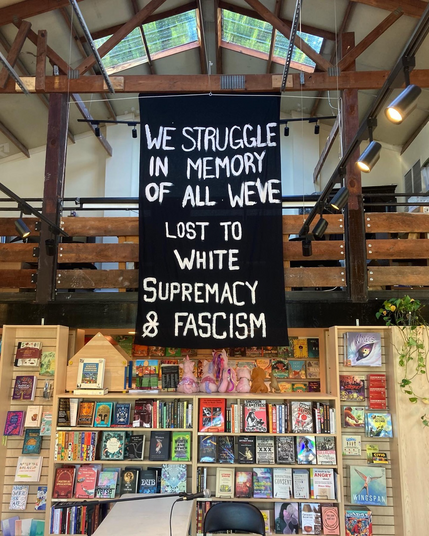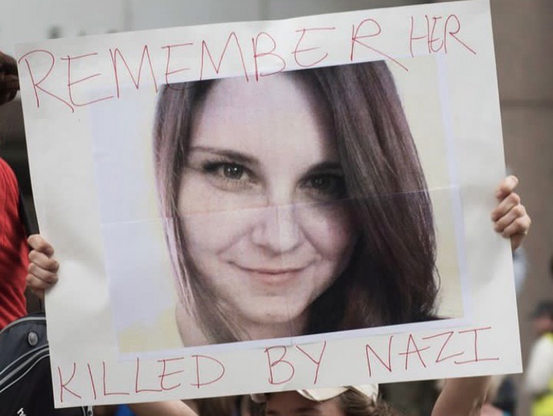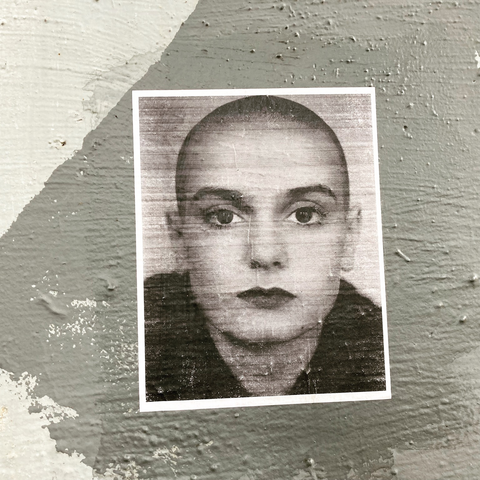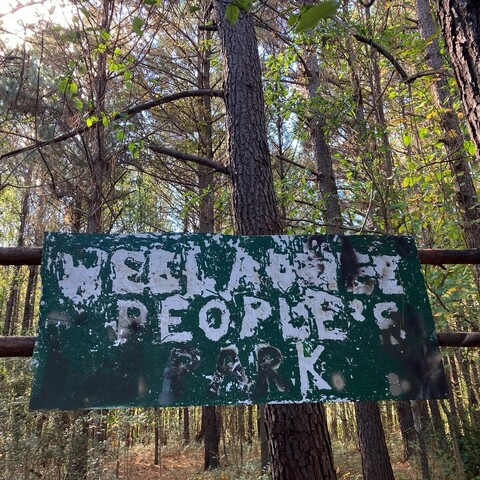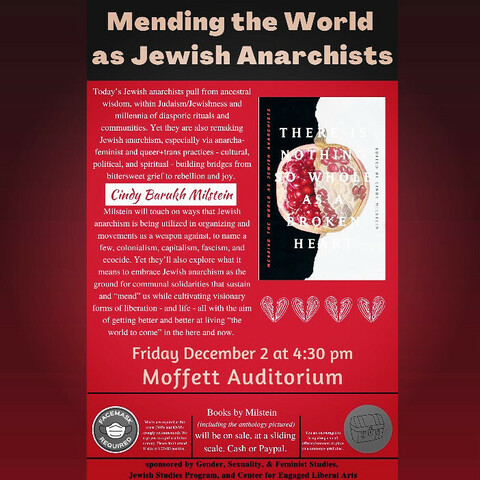Cindy Milstein · @cbmilstein
2298 followers · 377 posts · Server kolektiva.socialThere were so many sweet, tender, and moving moments at this past weekend’s @ACABookfaire—not to mention silly, inspiring, and connective ones (like the best and most wholesome kind of anarchist family reunions), among so many other dreamy descriptors—that it’s hard to narrow down examples, much less narrow down my gratitude to the organizers, tablers, presenters, and really everyone who converged at this bookfair.
But a highlight for me was the beautiful space made for not only honoring but also remembering and being vulnerably real about our grief—that is, sharing the whole of ourselves and life, with its abundance of joys and sorrows, wins and losses. There were three workshops related to mourning, ritual, dying, and death. There was an altar specifically built for the bookfair by an anarchist gravedigger and casket maker, and people added flowers, notes, art, photos, and herbal grief potions to it over the three days (see pictures 3 and 4).
And there was the friend from Durham, NC, who brought the banner pictured here, which they entrusted to me on the sixth anniversary of Charlottesville on August 12, and which @firestormcoop then let me hang in a prominent place of visibility and honor—over the area in the bookstore used for speakers during the bookfair. Six years ago, the banner was painted soon after Heather Heyer was murdered, and so many others were deeply injured and forever scarred, by fascists during the Unite the Right rally in Cville. It then was originally hung from the stone base of the first Confederate monument that folks tore down in NC, and later, on the one-year anniversary of that monument falling, it was hung up again—this time as part of an altar with names and flowers and candies around it, and folks read the names of people killed by the police in Durham.
The banner now has a home at Firestorm, as daily reminder that “we struggle in memory of all we’ve lost to white supremacy and fascism.” To my mind, all anarchist spaces should routinely make such room for the #ArtOfRemembrance, #RebelliousMourning, and #MendingTheWorld—which is about mending our own rebel hearts too.
#artofremembrance #RebelliousMourning #mendingtheworld
Cindy Milstein · @cbmilstein
2284 followers · 376 posts · Server kolektiva.socialOn this sixth yahrzeit of Charlottesville, I’m borrowing this photo posted by my dear, tender-hearted, brave, and loving friend @scottdanielwilliams as my small #RitualAsResistance.
May Heather’s memory be a blessing and continue to spark blessed transformations that mend this world.
May friends and any of accomplices who were in Charlottesville that day, whether forever scarred physically and/or emotionally by the fascists, or in any way forever changed, find blessing and comfort and communities of grieving.
May all of us who felt the impact from afar also find blessing and comfort and communities of grieving.
May we all continue to spark blessed transformations to mend this world, as direct actions of the grieving rebelliously and deeply, and caring and loving rebelliously and deeply.
#MourningOurLosses
#FightingForTheDead
#FightingForTheLiving
#MendingTheWorld
#ArtOfRembrance
#WeMustOutliveFascism
#RitualAsResistance #mourningourlosses #fightingforthedead #FightingForTheLiving #mendingtheworld #artofrembrance #wemustoutlivefascism
Cindy Milstein · @cbmilstein
2275 followers · 367 posts · Server kolektiva.socialMourning our dead—who herself did so much to mourn via her music against the often-murderous violence of the Catholic Church, colonialism, anti-Blackness, patriarchy, fascism, and more—as seen wheatpasted in a bunch of public places around so-called Asheville, NC.
There’s such strength in this image, with eyes so intent on seeing and confronting hard truths, underscoring her own lyric, “I’m proud to be a troublemaker.” And yet there’s a sorrow to this image, to those eyes, that almost unwittingly makes one start replaying other lyrics of hers, tape-loop style, in one’s head: “To say what you feel is to dig your own grave.”
Others have already said this, but it hits me every time I see this outdoor “altar” to Sinéad O’Connor / Shuhada’ Sadaqat: she, like other brave feminist truth tellers and healers, should have been honored in life, not relegated to a social death during life, nor had life made so hard and repeatedly abusive that death came too early.
May her memory spark a blessed revolution.
(photo: black-and-white headshot of Sinéad facing directly at the camera, with eyes wide open and no smile on her face, pasted on a buffed-gray wall)
#ArtOfResistance
#ArtOfRemembrance
#MourningOurDead
#MendingTheWorld
#ArtOfResistance #artofremembrance #MourningOurDead #mendingtheworld
Cindy Milstein · @cbmilstein
2015 followers · 223 posts · Server kolektiva.socialGrief rituals, one could argue, are part of the essential grounding for millennia-old cultures that orient toward far more ecological relations with the whole of this earth, including each other. For loss is part of the seasons of life, which ancient—and yet still here—cultures recognize needs to be honored through ceremony so as to remember what is loved and cherished, and continually reaffirm a duty to love and defend life.
It is little wonder that as colonialism and capitalism, heteropatriarchy and white Christian supremacy, grew into hegemonic death machines over the centuries, they tried to kill off innumerable life-giving rituals and ceremonies that humans passed along over generations to hold each other through transitions. They tried to make people forget that minds and bodies crave—and need—those rituals and ceremonies in order to sustain hearts and spirit. And without heart and spirit, humans become shells of themselves.
It is little wonder, then, that so many humans today, but especially human-made institutions like states and their police, are so hollowed out of heart—of empathy and sociability, solidarity and communal care—they all too easily acquiesce to or participate in killing off life.
It has been a week since Tortuguita was murdered in cold blood by cops within Weelaunee forest, where Tort gave full heart and loving spirit to defending life-giving ecosystems. May their memory be a blessing.
In that week, so many people have, in essence, “sat shiva,” a ritual within Jewishness that is about taking seven days to be with community (whether people or trees) to begin to honor and process loss of a beloved and grief at their murder. Shiva doesn’t mean doing nothing. It is a time to sustain our hearts and spirits.
So it’s remarkable—a testament to Tort as well as the big, amorphous, autonomous, yet interwoven circles of rebels—that this past week has witnessed an outpouring of remembrance that we do indeed need and can revive ancient grief rituals, as precisely the ground that allows us to keep fighting, not merely to #StopCopCity, but to stop all systemic theft of lands and life.
#RebelliousMourning
#MourningOurDead
#FightingLikeHellForTheLiving
#RitualAsResistance
#MendingTheWorld
(photo: sign with words “Weelaunee People’s Park” seen among the trees in October 2022 at @defendATLforest)
#StopCopCity #RebelliousMourning #MourningOurDead #fightinglikehellfortheliving #RitualAsResistance #mendingtheworld
Cindy Milstein · @cbmilstein
1990 followers · 214 posts · Server kolektiva.socialThere are no safe spaces. But there are sacred spaces.
At this moment in history, like other particularly brutal epochs, there is no separating that sacredness from the unsafeness.
That’s what this sacrilegious world order has forged over more than five hundred years of conquest, plunder, displacement, genocide, and ecological destruction. Its theft of land and lives, lifeways and ecosystems, has desecrated every corner of the globe.
Yet time and again, those who would defend land and freedom create brave spaces. Meaning despite the risks, often impossibly heavy ones, they find strength in the sacred, aiding them in fighting the good fight and holding them when they must mourn and honor their dead.
Perhaps that braveness, even when we’re afraid, is part of what compels our sacred duty all that much more.
We know what’s at stake, for one: the further loss of sacred places and sacred life. Yet equally, while we defend sacred spaces such as a forest, we know what it feels like to inhabit dignified lives worth living, in common with all living beings, because there is a magic to the sacred. The sacred animates life against their death machines.
Moreover, we understand that in our brave spaces, it is up to us, and only us, to love, care for, and protect each other, to make our spaces ever safer for us all. We know that any sense of safety comes though our love and solidarity, and when we’re lucky, glimpses of the spirit of far better social relations—in right relation with earth.
Brave spaces are most crucial, though, when bad things happen, including our worst nightmares, and our efforts at those “safer spaces” are momentarily shattered. We feel a sacred obligation to grieve the sacredness of what’s been stolen from us, including by making more brave and sacred spaces, like do-it-ourselves vigils, altars, and other tender spaces of remembrance on the dangerous landscape of this violent social system.
May all that is sacred embrace us now, because the big @defendATLforest community is hurting.
May Tortuguita’s memory be a blessing—and spark the blessedly ecological world they fought for.
#RitualAsResistance
#SacredSpaces #BraveSpaces
#MourningOurDead #MendingTheWorld
(photo: resanctified entry—after a cop incursion—into the Weelaunee forest, featuring red-and-black anarchist hearts painted on a pink-painted concrete slab and a #StopCopCity yard sign, as seen in October 2022)
#RitualAsResistance #sacredspaces #bravespaces #MourningOurDead #mendingtheworld #StopCopCity
Cindy Milstein · @cbmilstein
1378 followers · 116 posts · Server kolektiva.socialIt feels pretty special, blessedly so, to be able to do my first in-person talk and schmooze with others about an anthology that I started curating in the “before” times, which “routinely” included lots of book events at many beautiful spots, and finished in the early hellish pandemic days, and was birthed into print as the pandemic began to shift into another “new normal” part of the fascist social fabric. Like so many of us, I’ve been profoundly separated from so much I love these past 2.5+ years, including the delight of bringing the books I do—as labors of love—into the world among others.
But Jewishness, and especially queer anarchist Jewishness, is used to inhabiting liminal spaces, spaces of betweenness. Twilight is the par excellent moment—ecological and one could say trans or nonbinary sacred—that eases us into new months and new years, rituals and holidays, grief and transition. We also have millennia-long experience with separations, both traumatic and joyous, both forced on us and self-determined, whether in diasporic motion or through the separation between Shabbat (25 hours a week of dwelling in the world to come, as ongoing dress rehearsals of sorts) and havdallah, when we move out of the sacred into the mundane until the next Shabbos.
That ancestral legacy offers a palpable resilience, or perhaps fierce fighting spirit to survive, with many contemporary Jewish anarchists feeling affinity for the refrain sung by a village of Jews many moons ago as they were about to be slaughtered: “we will outlive them.”
At many points in this binary, brutal pandemic time of “masked” vs “unmasked,” mutual aid vs abandonment, I didn’t know that I would outlive it. The same may be true for you. Many folks we love didn’t outlive it. And that feels so much truer for so many of us in the days ahead, as fascism increasingly acts out and acts on its transphobia, misogyny, antisemitism, racism …
My Jewish anarchism teaches me so much, crucially right now that joy and sorrow are always intertwined, and that it is our task to not complete the task of mending the world, but not desist from it either.
💖🖤 to @scottbransonblurredwords for setting up this event!
Event description:
Mending the World as Jewish Anarchists
Using the anthology “There Is Nothing So Whole as a Broken Heart” as a jumping-off point, editor/writer Cindy Barukh Milstein will sketch a picture of contemporary Jewish anarchism and then facilitate a conversation. Today’s Jewish anarchists pull from ancestral wisdom, within Judaism/Jewishness and millennia of diasporic rituals and communities (without states). Yet they are also remaking Jewish anarchism, especially via anarcha-feminist and queer+trans practices—cultural, political, and spiritual—building bridges from bittersweet grief to rebellion and joy. Milstein will touch on ways that Jewish anarchism is being utilized in organizing and movements as a weapon against, to name a few, colonialism, capitalism, fascism, and ecocide. Yet they’ll also explore what it means to embrace Jewish anarchism as the ground for communal solidarities that sustain and “mend” us while cultivating visionary forms of liberation—and life—all with the aim of getting better and better at living “the world to come” in the here and now. Whether you’re Jewish or not, an anarchist or not (yet), come share in reflecting on the promise of Jewish anarchism.
Notes: At Oberlin on Friday just before Shabbat begins. To embody our collective care, masks are required at this event—with N95s and KN95s strongly recommended—and we urge everyone to rapid test before coming, and don’t come if sick or COVID positive. There will also be copies of the anthology and other books by Milstein for sale, at a sliding scale (cash or PayPal). Lastly, Milstein encourages everyone to bring along a small offering/memento to place on a temporary grief altar.
#AnarchismOrFascism
#WeMustOutliveThem
#MourningOurDead #MendingTheWorld
#TryAnarchismForLife
#TryJewishAnarchismForLife
#anarchismorfascism #WeMustOutliveThem #MourningOurDead #mendingtheworld #TryAnarchismForLife #TryJewishAnarchismForLife
